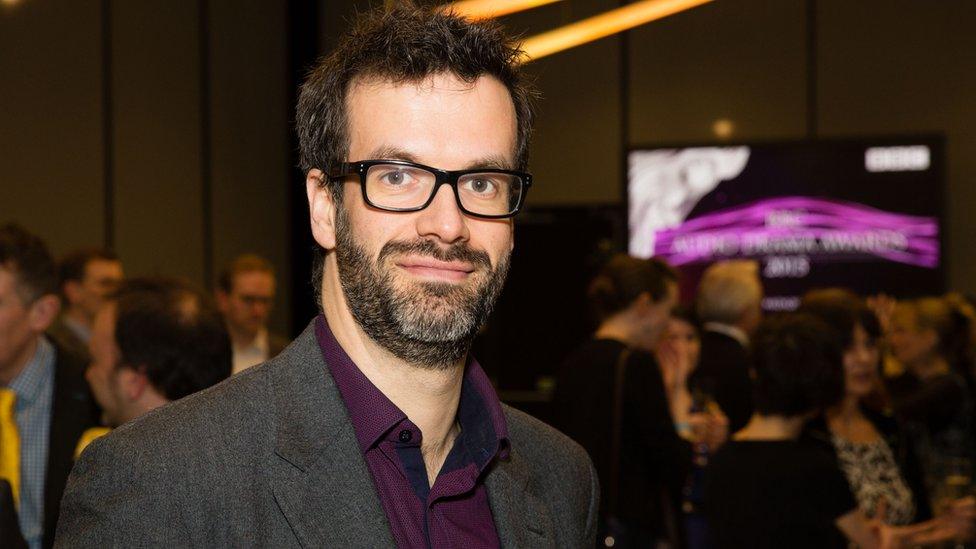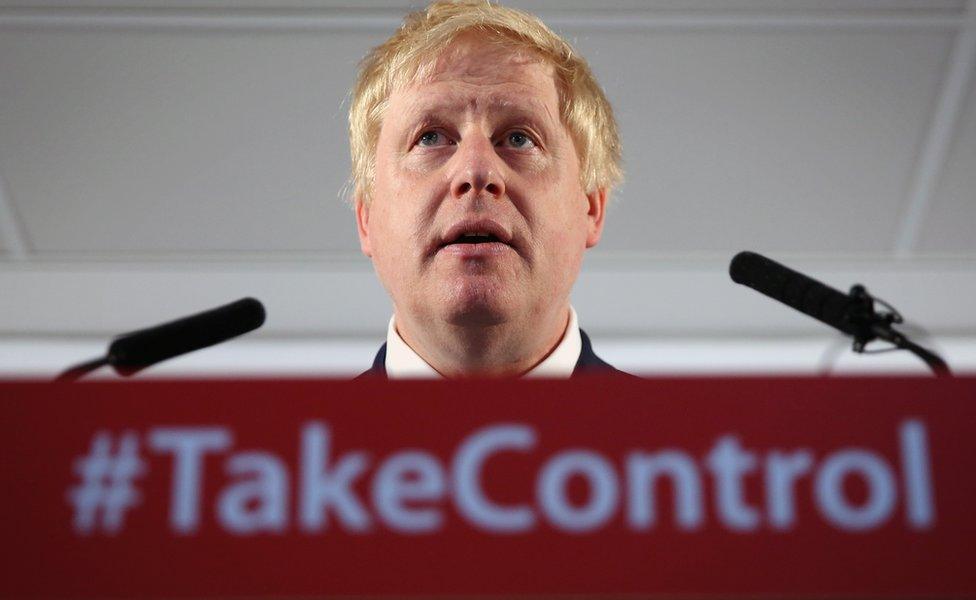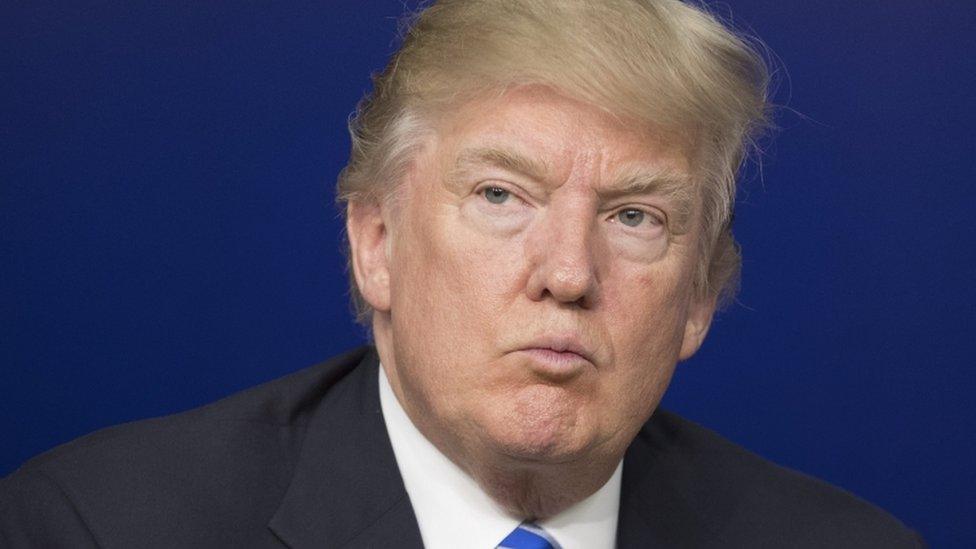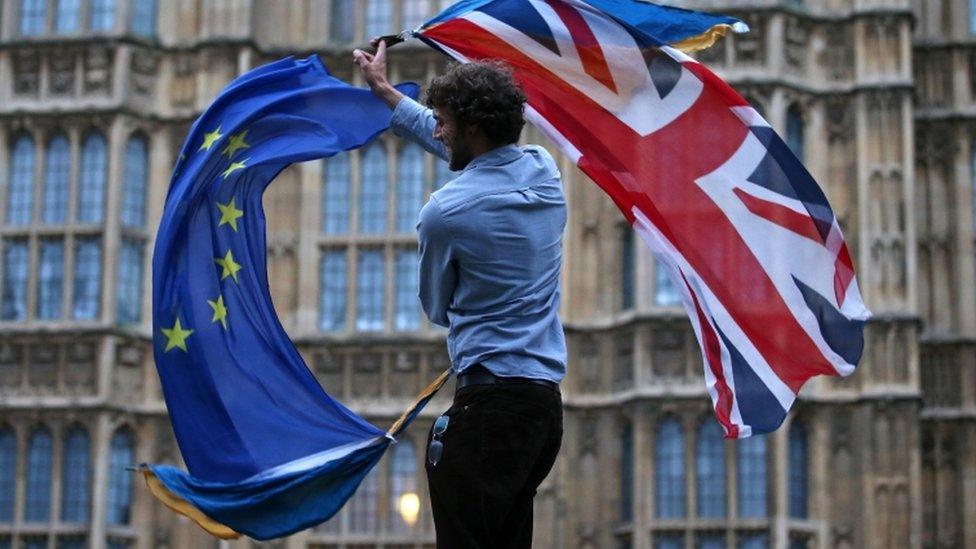How many pro-Brexit comedians are there?
- Published

Marcus Brigstocke is furious about the decision to leave the EU
Comedy and current affairs have always had a close relationship - but Brexit and Donald Trump's presidency have posed new challenges for comics.
Politics has long been a part of Marcus Brigstocke's comedy routine.
He's used to people not always agreeing with what he says, but this year it's been different.
The subject was Brexit and the reaction in some places was unlike anything he'd experienced before.
We met in Llandudno at the Craft of Comedy Festival. It's been described as the party conference of comedy - an annual get together to discuss the life and business of people making a living from making other people laugh.
I spoke to him at the end of a session on politics and comedy.
He explains that, as a result of his jokes, "a lot of the people I think of as 'my audience' post-Brexit will not be back... they were that angry."

Boris Johnson was one of the key figures of the Vote Leave campaign
Brigstocke is furious about the decision to leave the EU. The topic touches him more deeply than almost any other but he has doubts about this political passion.
"Anger's not great for comedy, it's been good for me but you still have to have nuance. You have to find the line and I've struggled with that."
"People are more upset about this than anything else I have experienced."
Gareth Gwynn is one of Britain's most prolific topical gag writers. He's worked on Have I Got News For You, the Now Show and the News Quiz on BBC Radio 4.
He has a different concern about Brexit.
"Since June 2016 almost every time you walk in to that writers' room and it's tail it's Trump, heads it's Brexit," he says.
"It's so big we can't avoid it and the problem is trying to come up with new angles. It's both potentially trying for both the writers and the audience."

Brexit and Donald Trump's presidency have posed new challenges for comics
The passions aroused by Brexit are, it appears, challenging for satire. Britain is deeply divided and that poses problems.
Josh Buckingham is a commissioner for Channel 4. It is legally obliged to be politically impartial and while it can delight in taking pot shots at politicians it can't do it from just one perspective.
He feels some viewers who spend a lot of time watching online content may not be so open to this.
"Audiences expect you to have a view and when they encounter you being even handed they might say, 'pick a side', he explains.
Of course many comics have picked a side. The divide? Marcus Brigstocke could only think of two or three comics who might admit to being pro-Brexit - Lee Hurst and Geoff Norcott are notable examples.
In a room of more than a hundred writers, producers and performers - we asked if any would come forward and admit to being pro-Brexit.
Only one person put their hand up. One or two others approached me quietly afterwards but didn't want to be interviewed.

The UK is scheduled to leave the EU on Friday, 29 March 2019
The one person that agreed to speak was James Cary, a writer of sitcoms. He's also an evangelical Christian and used to being in a minority in the comedy world. He's happy to be contrary.
"I think it's because Brexit is associated with conservatism and patriotism and nationalism and these are things comedians like to play against," he says.
"I think it's led to a really interesting discussion. I think you've got to be very careful about impugning anyone's motives... England and London are very different places"
He adds: "We have to be wary of describing one as a metropolitan elite and likewise seeing people in England backward, nationalistic and patriotic and racist."

Follow us on Facebook, external, on Twitter @BBCNewsEnts, external, or on Instagram at bbcnewsents, external. If you have a story suggestion email entertainment.news@bbc.co.uk, external.